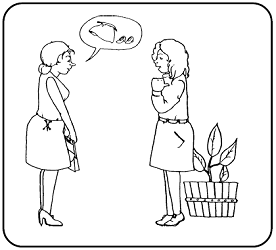 |
||||||||||||||||||||||||||||||||||||||||||||||||||||||||||||||||||||||||
In lesson 4, you will review expressions, adverbs and prepositions which are associated with the Unit theme, which is centred on decisions about clothing. The rubric Читання на розуміння (Reading for Comprehension) will be a part of this lesson as well. Вислови
The phrase до лиця indicates that something suits you or looks good on you. The literal translation is that something looks good ‘to your face’. When using the phrase, the name of the person to whom you are referring appears in the Dative case:
You are very well acquainted with the use of many Ukrainian prepositions and their cases. The two exercises which follow allow you to review what you know. XXVII. Exercise 4.і
XXVII. Exercise 4.іі
Read the paragraph silently, then out loud. Use a dictionary (your own, or an online version) if you are have difficulty understanding any of the words. Some exercises will follow in this lesson and in the Unit Assignment. This link will take you to a Wikipedia webpage about a well known singer and songwriter from Ukraine, Ruslana. To access a brief summary in Ukrainian, click the language preference on the left-hand side of the English Wikipedia link given above. XXVII. Exercise 4.іii Based on your reading, indicate whether the statements about Ruslana are true or false. Біографія і карєра Руслани
XXVII. Exercise 4.iv Write a brief summary (10-15 sentences) in Ukrainian about Ruslana. ___________________________________________________________________________ ___________________________________________________________________________ ___________________________________________________________________________ ___________________________________________________________________________ ___________________________________________________________________________ ___________________________________________________________________________ ___________________________________________________________________________ ___________________________________________________________________________ ___________________________________________________________________________ ___________________________________________________________________________ ___________________________________________________________________________
In the above sentence, the adverb обов’язково can be understood to mean definitely, certainly, absolutely. It is created from the noun обов’язок (commitment, obligation). If you want to assure someone that you will keep a commitment, your English response might contain the following adverbs:
XXVII. Exercise 4.v Determine how you would respond to each scenario below. At least 4 of your responses must be negative, with a reason given for your answer.
1. Лесю, чи ти прийдеш до парку на український фестиваль?
The reading below contains vocabulary related to the Unit theme. Read the dialogue aloud as oral practise. Зеновія у крамниці Sears. Вона бачить Галину.
XXVII. Exercise 4.vi Change the underlined words in order to create a new, but similar dialogue between two males. Hint: The boys will drive to the new store (not walk). ___________________________________________________________________________ ___________________________________________________________________________ ___________________________________________________________________________ ___________________________________________________________________________ ___________________________________________________________________________ ___________________________________________________________________________ ___________________________________________________________________________ ___________________________________________________________________________ ___________________________________________________________________________ ___________________________________________________________________________ ___________________________________________________________________________
|
||||||||||||||||||||||||||||||||||||||||||||||||||||||||||||||||||||||||
|
||||||||||||||||||||||||||||||||||||||||||||||||||||||||||||||||||||||||



![MMAG00294_0000[1]](u7l4_clip_image001.gif)



